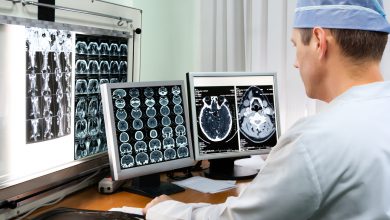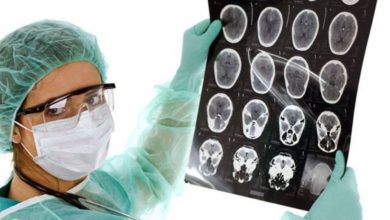How long do people live with a brain tumor?
The content of the article

One of the most dangerous and rare forms of carcinoma (malignant neoplasm) today is a brain tumor. How long do they live with her? What kind of disease is this? What stages are there? What are the symptoms? What are the forecasts? These and other questions need to be considered when talking about this pathology.
Causes of the disease
Brain cancer appears due to the following factors:
- Hereditary gene pathologies. Based on this factor, the disease occurs in 5% of cases. The diseases include: Gorlin syndrome, tuberculous sclerosis, Li-Fraumeni syndrome, APC gene disorder and Bourneville disease.
- Weak immunity. May occur after organ transplant surgery or in AIDS-infected patients.
- Frequent nervous breakdowns, stress, depression and negative influence from others.
- Race and gender. Women and people with white skin are more likely to suffer from this condition.
- Bad ecology.
- Foods eaten with GMOs.
- Long-term exposure to radiation or chemicals on the human body.
- Patient's age. As you age, the likelihood of brain cancer increases and it is more difficult to cure. The tumor also occurs more often in children.
- Secondary tumor. Acquired as a result of metastasis to the skull area.
- Bad habits (smoking, alcohol, drugs).
Symptoms
Doctors divide the symptoms of a brain tumor into two types: focal and cerebral. The former depend on the location, and the latter occur in all cases of cancer.
Among the focal symptoms:
- impaired sensitivity or mobility of the limbs;
- sudden change in the patient’s character (temper, calmness, indifference, apathy, irritability, frivolity and various mental disorders);
- problems with urination (involuntary or difficult).
Among the symptoms of malignant brain tumors of all types, the following can be observed:
- Dizziness, imbalance, changes in gait, loss of orientation in space. Dizziness can occur even in a horizontal position.
- Headache. As a rule, they occur in the mornings and evenings and have a dull, bursting character, aggravated by coughing and sneezing. And taking antispasmodics does not give any results.
- Insomnia or constant fatigue.
- Facial distortion (tilt of the mouth, eye or eyelid). Occurs due to compression of the nerves.
- Nausea and vomiting. It can occur uncontrollably, not always after eating, and without taking the proper medications, leading to severe dehydration.

- Deterioration, clouding or complete loss (in the later stages) of vision, “spots” in the eyes.
- The appearance of hearing problems.
- Epileptic seizures.
- Sudden and causeless weight loss.
- Increased body temperature. This happens because cancer cells attack the immune system.
- Hormonal imbalance.
- Sudden changes in blood pressure.
- Serious symptoms include breathing, taste, smell and swallowing problems.
- Sound, olfactory, auditory and visual hallucinations, impaired color perception.
- Brief paralysis.
- Sudden surges in intracranial pressure.
Often patients attribute some of the listed symptoms to fatigue that occurs during long work and constant stress. Therefore, a patient often comes for help when stage 1 of a brain tumor has already passed. People prefer to be treated at home and on their own. If they experience pain, they take painkillers, if they have vision problems, they buy lenses, and to eliminate memory problems and hallucinations, it is easier for them to drink sedative herbs. Meanwhile, the disease progresses and the patient loses precious time fighting it. a brain tumor is not detected and treated in time , the patient will not have long to live with it.
If you have the slightest suspicion or doubt, you should visit a therapist who will prescribe various necessary tests. If it is not possible to visit a specialist, then it is enough to do a biochemical blood test . And if any deviations are detected, you need to undergo a more thorough examination.
Stages of brain cancer
How long people live with symptoms of a brain tumor directly depends on the degree of pathology.
Transitions from stage to stage, as a rule, occur very abruptly and asymptomatically, so it is impossible to accurately determine them. If the tumor has affected the brain stem, its stage can only be determined after the patient’s death.
First stage of brain cancer
At this stage of brain cancer, surgery can help because only a small number of cells are affected. After removing a brain tumor at this stage , the question “how long do they live after surgery” can be answered that the problem is 99% solved.
It is almost impossible to recognize the disease at this stage, since, as a rule, there are practically no symptoms of cancer, and doctors attribute them to the change of season and colds.
It is possible to detect a tumor at this stage only after undergoing special diagnostics.
How long patients live after surgery directly depends on compliance with the rules and recommendations of the doctor. The patient can live 5 years or more. The survival rate after treatment is 80–90%.

Second stage of brain tumor
The tumor at this stage compresses the brain centers, beginning to grow rapidly. Symptoms at this stage of the disease include convulsions, seizures, gastrointestinal problems, nausea and vomiting.
At this stage, surgery is the first step to treat the tumor. It should only be performed by a highly qualified neurosurgeon. The chances of curing the disease are much lower compared to stage 1. But the survival rate for brain cancer of this stage is still high. After surgery and with proper treatment, life expectancy is 2–3 years. After 65 years of age, people with this stage of cancer live no more than 3 years.
Brain cancer stage 3
The tumor at this stage begins to grow rapidly, surgical intervention is almost impossible. But if the cells are localized in the temporal lobe, surgery can give positive prognoses.
Symptoms at this stage are:
- hearing impairment;
- vision problems;
- speech disorder;
- absentmindedness;
- memory loss;
- imbalance;
- fluctuation of pupils.
Patients with this stage of brain cancer rarely live longer than two years with constant use of painkillers. It often happens that the tumor develops so rapidly that a person “burns out” before our eyes within a few months. To achieve better results, the patient should not “give up” and tune in for the best.
To treat this stage of the disease, alternative and experimental methods are sometimes used, which help some patients cope with the pathology. The problem with such methods is the lack of clinical trials, which can also provoke a reverse adverse reaction from the body.
Brain cancer stage 4
At this stage of a brain tumor, surgery is no longer performed. Treatment includes medications, radiation therapy , and painkillers.
If a patient has stage 4 brain cancer, the prognosis is disappointing. Here the patient’s immune system and his attitude towards a positive outcome play a big role.
With a stage 4 brain tumor, the patient’s basic functions of the body are disrupted, and stage 3 symptoms intensify.

If treatment for stage 4 brain cancer does not produce positive results, the patient falls into a coma, from which he most likely does not recover.
Malignant brain tumors come in the following varieties:
- with a classical flow;
- with uncharacteristic symptoms;
- fast growing. This type of stage 4 brain cancer is almost always fatal.
Modern medicine is unable to overcome stage 4 glioblastoma. With constant treatment and courses of therapy, a patient with this diagnosis will live no more than a year. And in cases where therapy is ignored, such patients live for literally several months.
How long do people live with a brain tumor?
Many patients, faced with the symptoms of brain cancer, wonder: how long can they live with it?
In order to characterize how long people live with brain cancer, the term “five-year survival rate” is used in medicine. Some patients live longer than 5 years after treatment, while others are forced to undergo constant treatment. Young people have a better chance of five-year survival than older people.
But unfortunately, even after complete recovery, no doctor can guarantee that the disease will not return again after a while. Therefore, patients who have undergone a course of treatment and received positive results are required to undergo regular examinations and adhere to a correct lifestyle.
How long patients with a malignant brain tumor live depends on:
- stages of the disease;
- localization of pathology. If cancer cells invade the brain stem, survival is almost impossible. In cases where the tumor is located just under the cranial bone, it is possible to operate;
- metastases. If they occur in other parts of the brain or organs, the chances of cure are almost zero.
When a disease is detected, the patient must completely change their lifestyle: follow a diet , sleep and rest, protect themselves from possible stressful situations and undergo regular therapy.

The average survival rate for a brain tumor is 35%, if the tumor is malignant - 5%.
After surgery and positive dynamics of the disease, patients live more than 10 years or can count on a complete cure.
How long do people live with stage 4 brain cancer?
Survival after this diagnosis is 2 months, but there are cases (4–5%) when patients lived for several years after detection of the tumor. As a rule, by this time metastases have spread throughout the body, and the tumor affects the entire brain.
Usually, doctors, when asked by patients with stage 4 disease “how long do they live with brain cancer,” try to soften the circumstances a little and avoid a direct answer. Otherwise, the diagnosis can morally destroy the patient and reduce his remaining time significantly.
Diagnostics
Symptoms of the disease vary, and a patient with a larger tumor may experience less severe symptoms than a patient with a small tumor. The first thing the patient should do is visit a local physician, who will prescribe further tests.
An ophthalmologist can identify the disease by the condition of the eyeball.
When a patient consults a doctor with symptoms of the disease, he is prescribed:
- neurological examination;
- positive emission tomography;
- CT;
- MRI;
- angiography and other radioisotope techniques;
- magnetoencephalography;
- surgical intervention;
- stereotactic biopsy;
- venticuloscopy;
- Lumbar puncture.
Only after carrying out all the necessary studies can the doctor draw conclusions about the patient’s health status, determine the stages and possibilities of treatment.
Treatment
Today, treatment of patients with brain cancer is carried out in the following ways:
- Neurosurgery. Not always possible due to the dangerous and inaccessible location of the tumor. In surgery, cryosurgery is actively used (exposure to affected tissues with liquid nitrogen), which is considered very effective. Gamma Knife and CyberKnife are very indispensable in the initial stages of the disease. They remove the DNA of harmful cells, thereby blocking the development of the source of the disease.

- Chemotherapy . Pharmaceuticals are prescribed by injection or orally. As a rule, it does not bring the desired results and is prescribed only after completing a course of radiation therapy. This treatment method affects the entire body as a whole, and not just the affected tissues. Chemotherapy is carried out in a course of several cycles, with breaks between which are necessary. The consequences of this type of treatment may include hair loss, brittle nails, impaired skin integrity and the appearance of cracks in it.
- Radiation therapy. Radiation therapy is prescribed after surgery to get rid of damaged tissue that doctors have not removed or in cases of contraindications for surgery, the duration is from 7 to 21 days. Brachytherapy is a therapy during which a radioactive substance is injected into the affected tissue. External beam radiation therapy is a course during which the patient is exposed to radiation.
- Drug treatment. It is effective only in combination with other therapy and is carried out before surgery. The drugs can be anticonvulsants (relieve symptoms of stage 2 and later) and steroidal anti-inflammatory (relieve pressure on healthy areas). Often the patient is prescribed medications to relieve unpleasant symptoms, such as painkillers or antidepressants.
- Endoscopic treatment. This is a less traumatic method than neurosurgery. This method of surgery minimizes damage to nerves and blood vessels, but increases the recovery time for the patient due to craniotomy.
The rehabilitation period after surgery lasts more than one month, because the patient will need a lot of strength to get back into action.
Prevention
Having heard from doctors such a terrible diagnosis as brain cancer, many fall into numbness and mentally begin to say goodbye to this world. This is a completely wrong attitude. Doctors have long been telling stories about miraculous healings of people in serious condition who believed in the best.
In order not to encounter this terrible disease, doctors recommend trying to follow simple rules:
- you need to exclude processed meat products (sausages, smoked meats, ham) and chips from your diet;
- you should spend less time talking on your mobile phone, use headphones or a speakerphone for these purposes;
- You should avoid interaction with radioactive radiation, vinyl chlorides and other toxic substances;

- It is not advisable to use the sugar substitute aspartame;
- You should regularly undergo preventive diagnostics in the form of MRI;
- you cannot smoke tobacco, cigarettes and cigars;
- you need to spend more time in the fresh air, on walks and outside the city. Oxygen saturates and restores brain cells;
- Avoid drinking energy drinks and large amounts of caffeine;
- you should try to worry less and avoid nervous situations;
- you need to stop eating fried foods;
- You should not take vitamin supplements (BAS);
- You should eat healthy foods containing vitamins (vegetables, fruits). Oranges, tangerines, lemons, bell peppers, red cabbage, carrots, legumes, green leafy vegetables (spinach and lettuce), broccoli, beets, and green tea have anti-carcinogenic properties. And onions, garlic, whole grains and brown rice will strengthen your immune system. Pasta should be chosen from wholemeal flour, whole grain bread;
- If you experience any unfavorable symptoms, you should consult a doctor;
- It’s worth leading a healthy lifestyle, playing sports (not necessarily professionally, just doing exercises or walking 30 minutes a day). Regular physical activity will strengthen the cardiovascular system and thereby improve blood supply to the brain;
- You should adhere to a sleep schedule, which means getting enough sleep at night, since the hormone melatonin, which strengthens the immune system, is produced only at this time of day. Reduced immunity is a “green signal” for cancer;
- Under no circumstances should you drink alcohol, much less abuse it. Getting rid of this bad habit will reduce the risk of disease by 30%;
- You should also be careful with a tan.
By adhering to these rules, a person does not give cancer any reason to arise. The disease will almost certainly not occur in people who lead a healthy lifestyle and take care of themselves.
A brain tumor is a serious disease that is difficult to treat, and if in the case of the first stage of brain cancer there is a chance to forget about this disease forever, then starting from the second stage the patient is forced to fight the disease for the rest of his life, adhere to the treatment and recommendations of doctors, or fight off the disease precious time (third and fourth stages). But it is always worth remembering that there are exceptions to everything and miraculous recovery is not at all uncommon among cancer patients.
Please rate the article:

 (25 ratings, average: 4,16 out of 5)
(25 ratings, average: 4,16 out of 5)



